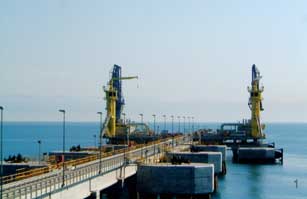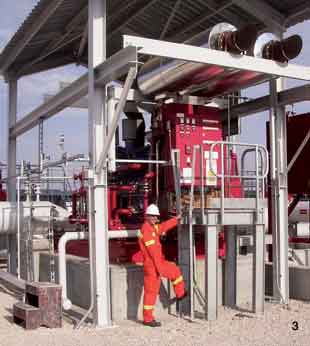|

Winter 2005 (13.4)
Pages
92-95
Petroleum
BP Developments: Production Begins at West Azeri
by Tamam
Bayatly, Communication Manager
The New Year arrived
in BP Azerbaijan with the start up of oil production from the
new platform in West Azeri (Azeri Project Phase 2), as part of
the Azeri-Chirag-Gunashli (ACG) field development in the Azerbaijan
sector of the Caspian Sea.
Located in approximately 118 meters of water 100 km east of Baku,
West Azeri (WA) production began from the first of three pre-drilled
production wells on December 30, 2005. Transiting the subsea
pipeline to shore, WA oil production reached Sangachal on January
3, 2006. Production will increase through 2006 as the other pre-drilled
wells are brought online, prior to further platform drilling
which will begin later this year. Total production from WA is
forecast to be approximately 3.5 million tons this year (equivalent
to 70,000 barrels of oil on average per day).
"The start up of West Azeri is as important as our achievement
of our First Oil from Central Azeri last year," said David
Woodward, BP's Associate President in Azerbaijan. "It marks
the culmination of our efforts to consistently meet our target
of delivering a platform a year between now and 2008. The start
up of WA will contribute to the rapidly increasing volumes of
oil from ACG flowing into BTC once it becomes fully operational
in spring this year."
"I'm proud to say that we have delivered WA oil four months
ahead of schedule and this is thanks to our ACG Project and Operations
Teams' excellent performance building on a track record of planning,
construction and operations delivery in the Caspian Sea.
On this important day for Azerbaijan, BP and our ACG partners,
I would like to recognize the hard work of more than ten thousand
people, mostly from Azerbaijan, who have consistently delivered
outstanding performance on this project over the past three years.
I would also like to congratulate the government, our partners,
employees, all the contractors and suppliers and everyone involved,
on this tremendous achievement."
The WA facilities comprise a 48-slot production, drilling and
quarters (PDQ) platform and a 30" oil pipeline tie - in
to the onshore Sangachal Terminal.
Oil from WA will be transported via the new 30" subsea pipeline
to the onshore Sangachal Terminal, which has been expanded (including
three new crude oil storage tanks) to receive the additional
oil volumes from the ACG field. The Azeri Project Phase 2, which
includes West and East Azeri, will add production of more than
20 million tons per year (420,000 barrels per day). During Phase
2 of the PSA (Production Sharing Agreement) period, 210 million
tons (1.6 billion barrels) of reserves are expected to be produced.
Associated gas produced from WA will flow via in-field gas subsea
pipelines to the Compression and Water Injection Platform (C&WP)
installed in Central Azeri for re-injection into the reservoir
for pressure maintenance or for use as fuel. Surplus gas will
be exported via an existing gas subsea pipeline into the Sangachal
Terminal and onward via the new gas export pipeline into the
Azerigas system for domestic use.
David Woodward
Honored
The other fascinating New Year story for BP Azerbaijan came from
London with the news that its Associate President David Woodward
had been made a Companion of the Order of St. Michael and St.
George by Her Majesty Queen Elizabeth II in the New Year's Honor
list, announced on January 1. The honor, which was established
by the Prince Regent, later King George IV, in 1818, is given
for "extraordinary and important service" by UK citizens
working overseas. It recognizes Mr. Woodward's achievements during
his seven years leading BP's activities in Azerbaijan.
"This is a tremendous honor and I'm very proud to be recognized
in this way," said Mr. Woodward. "It has been a great
privilege to work alongside my colleagues in BP, our oil company
partners and our contractors, together with the government to
realize Azerbaijan's oil and gas potential. I remain indebted
to all those working as part of this broader team for their contribution
to the success of our projects. This award is as much a tribute
to their efforts as mine.
  "I'm
very pleased that we have also been able to support the Government
of Azerbaijan in its own endeavors - particularly revenue management
and in its ground-breaking adoption of the UK Extractive Industries
Transparency Initiative. "I'm
very pleased that we have also been able to support the Government
of Azerbaijan in its own endeavors - particularly revenue management
and in its ground-breaking adoption of the UK Extractive Industries
Transparency Initiative.
Left: BP's Associate President David Woodward
was recently honored as a Companion of the Order of St. Michael
and St. George by Queen Elisabeth II. Woodward has been involved
with oil porjects in Azerbaijan since 1999. Photo: BP.
Over the past 15 years, we have witnessed the development of
strong links between the UK and Azerbaijan, and I remain committed
to furthering good relationships between our two countries,"
he added. At present 27 BP Azerbaijan employees are working on
assignments with BP in the UK. BP also supports the John Smith
Fellowship program, which was awarded to two young Azerbaijanis
for the first time in 2005.
The program also funds English language courses, which are administered
by the British Council for local staff, journalists and NGOs.
This year, BP also helped set up the UK-Azerbaijan Alumni Network
for Azerbaijani students who had studied in the UK. David Woodward
was appointed President of BP Azerbaijan in January 1999.
Through BP's role as Operator, he has overall responsibility
for development and operation of the Azeri-Chirag-Gunashli (ACG)
offshore oilfield, the Baku-Tbilisi-Ceyhan (BTC) pipeline project,
the Shah Deniz offshore gas development and pipeline project,
and for BP's exploration activities in the Southern Caspian and
the Eastern Black Sea.
David joined BP in 1970, and has worked in a variety of engineering,
operation and general management posts in London, Aberdeen, Abu
Dhabi, Norway, Alaska and Russia. He has an Master of Science
degree in Physics from the University of Sussex and attended
the Program for Management Development at Harvard. He is a Chartered
Engineer and a member of the Institution of Mining and Metallurgy,
as well as the Society of Petroleum Engineers.
Woodward is married and has two children. Previous honors include:
the "Order of Honor" from Georgia (2003) and the "Order
of Glory" from Azerbaijan (2004).
Gunashli Pre-Drilling
The Deepwater Gunashli (DWG also known as Phase 3) pre-drilling
program - the last within the Azeri - Chirag-Gunashli development
- commenced in late December 2005. This followed the successful
completion of the pre-drilling program at the East Azeri (EA)
location.
The first DWG pre-drill well was spudded on December 28 by the
Dada Gorgud semi-submersible drilling rig. The DWG platform template
pre-drilling program currently consists of seven wells, six of
which are planned as producers and one as a cuttings re-injection
well (to be used for platform drilling activity only). In addition
to the pre-drilled platform template wells, the DWG drilling
campaign also includes six sub-sea water injection wells, which
will also be drilled using the Dada Gorgud as part of the Phase
3 Development. The planned duration of the DWG pre-drilling and
sub-sea injection well drilling program will take nearly two
and a half years.

Above: Flares against the Sunset in the Caspian:
the West Azeri Platform, located 100 km east of Baku. In the
distance, note the Central Azeri Platform, and the Compressor
and Water Injection Platform (C&WP). Photo: BP.
BTC Turkish Linefill
BTC construction progressed smoothly during last year. On November
17, oil crossed the Georgian-Turkish border and reached Pump
Station No. 1 in Turkey (PT1) the following day with more than
4 million barrels of oil in the pipeline. On January 4, 2006,
oil reached the Intermediate Pigging Station No. 2 (IPT2) in
Turkey, which is the highest elevation facility along the entire
BTC line and is close to the city of Kars. From IPT2, oil then
headed for Pump Station No. 2 in Turkey (PT2). The line-fill
started up from the Sangachal Terminal in Azerbaijan in May 2005.
It had reached the Azerbaijan - Georgian border and entered the
Georgian section by August 2005. The oil line-fill and completion
of the BTC pipeline is continuing. Rigorous testing and commissioning
activities will ensure the integrity and safety of each section
of the pipeline prior to introducing oil. This is taking longer
than expected but the aim is to complete this safely and ensure
that the pipeline will operate efficiently for the next 40 years
or more.
Below:
1, 2, 3. Ceyhan Terminal
at the Turkish Mediterranean part, final destination point of
BTC (Baku-Tbilisi-Ceyhan) pipeline. Part is being readied for
the ACG (Azeri-Chirag-Gunashli). Photos: BP.
  The
company continues to make steady progress in the line-fill program
and is now planning the official inauguration of the Turkish
section of the pipeline and the Ceyhan Terminal to take place
in spring 2006 once oil has reached the terminal and the first
tanker has been loaded. The
company continues to make steady progress in the line-fill program
and is now planning the official inauguration of the Turkish
section of the pipeline and the Ceyhan Terminal to take place
in spring 2006 once oil has reached the terminal and the first
tanker has been loaded.
The Turkish section of the pipeline is 1,070 kilometers long
and includes four pump stations, two metering stations and the
Ceyhan marine export terminal, which itself consists of seven
crude oil storage tanks, and a two-kilometer long jetty to load
two tankers of up to 300,000 dwt simultaneously.
Commissioning of the Ceyhan Terminal facilities is already underway,
using a cargo of crude oil delivered from the Supsa (Georgia)
terminal. Following commissioning, the terminal will be fully
ready to receive oil through BTC on arrival at Ceyhan.
At Sangachal Terminal, the BTC head pump station Phase 1 pumps
are successfully operating while the commissioning of the BTC
Phase 2 pumps is 99.5 percent complete.
  A total
of 10 million barrels of crude oil is required to fill the 1,768
km long line running from the Sangachal Terminal near Baku via
Georgia to the Ceyhan Terminal on the Mediterranean coast of
Turkey. The oil originates from the ACG field in the Azerbaijan
sector of the Caspian Sea. BTC will bring significant benefits
to the region. By avoiding the Bosphorus Straits, it will help
relieve the inevitable growth in oil-related traffic and associated
environmental risks, while creating substantial revenues for
the transit countries, and will help strengthen economic and
political links between Azerbaijan, Georgia, Turkey and the West. A total
of 10 million barrels of crude oil is required to fill the 1,768
km long line running from the Sangachal Terminal near Baku via
Georgia to the Ceyhan Terminal on the Mediterranean coast of
Turkey. The oil originates from the ACG field in the Azerbaijan
sector of the Caspian Sea. BTC will bring significant benefits
to the region. By avoiding the Bosphorus Straits, it will help
relieve the inevitable growth in oil-related traffic and associated
environmental risks, while creating substantial revenues for
the transit countries, and will help strengthen economic and
political links between Azerbaijan, Georgia, Turkey and the West.
South Caucasus
Pipeline (SCP)
The overall SCP project is about 96 percent complete, and by
the end of 2005, the overall pipeline construction was 93 percent
complete in Azerbaijan and more than 85 percent complete in Georgia.
They have already hydro-tested some 75 percent of the 442.4 km
Azerbaijan section of the pipeline. Good progress has also been
achieved in Georgia, where the focus has been on completing the
high ground work depending on the weather conditions. In Georgia
they have hydro-tested 80 percent of the high ground sections
of the pipeline. In both Azerbaijan and Georgia, current activities
also focus on the main line block valve stations.
In addition, the Turkish offtake facility is 100 percent complete
and the Georgian offtake is about 99 percent complete. The Azerbaijan
offtake is within the Sangachal terminal scope. The SCP pipeline
is scheduled to start system commissioning in the second quarter
of this year and be completed to deliver first gas from Shah
Deniz to Azerbaijan, Georgia and Turkey by the winter of 2006.
  Shah Deniz Shah Deniz
In January, the Shah Deniz partnership successfully completed
the drilling of the fourth pre-drill well and spudded the fourth
appraisal well (SDX-04) under the Shah Deniz Production Sharing
Agreement (PSA). The wells are being drilled by the Istiglal
semi-submersible drilling rig.
The fourth pre-drill well was drilled through the Shah Deniz
Stage 1 template to a total depth of 6,189 meters.
The well was then logged and after the production liner run,
it was suspended, awaiting the installation of the TPG-500 platform
later this year and subsequent completion as a gas producer.
The Istiglal was moved to the SDX-04 location in the southwestern
part of the Shah Deniz field on January 10.
The SDX-04 well will be drilled to a total depth of more than
7,000 meters.
The previous three exploration and appraisal wells (SDX-01, SDX-02
and SDX-03) were designed to appraise and delineate the Stage
1 reserves in northern flank of the field. The SDX-04 well will
appraise and delineate the resources in the southern flank of
the field and will also test for gas presence in deeper horizons.
The SDX - 04 will take approximately six months to drill and
production testing could extend the well's duration by several
months in order to confirm the commerciality of the gas reserves
in the southern extent of the field. The Stage 1 project is progressing
according to schedule to meet the target of delivering first
gas to the market before winter 2006.
Back to Index AI 13.4 (Winter
2005)
AI Home
| Search | Magazine
Choice
| Topics
| AI Store | Contact us
Other Web sites
created by Azerbaijan International
AZgallery.org | AZERI.org | HAJIBEYOV.com
|